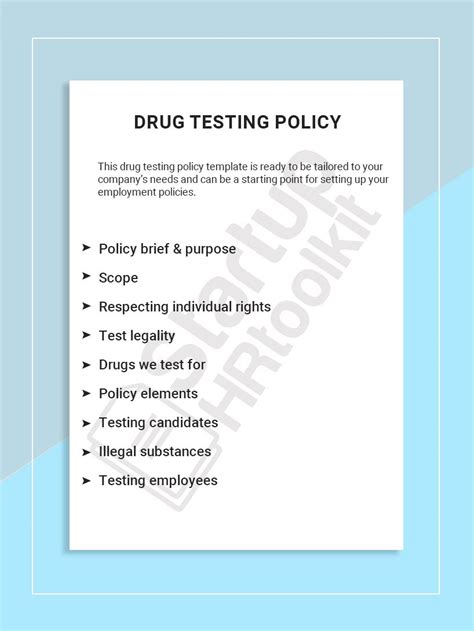Company Drug Testing Policies: Everything You Need To Know

Drug testing policies are becoming increasingly common in the workplace. In fact, according to a survey conducted by the Society for Human Resource Management, 57% of employers conduct drug tests on all job candidates, and 69% of employers conduct drug tests on all employees.
What is a drug testing policy?
A drug testing policy is a set of guidelines and procedures that an organization follows to detect and prevent drug use in the workplace. The policy typically outlines when drug testing will be conducted, what types of drugs will be tested for, and the consequences of a positive test result.
Why do companies have drug testing policies?
Companies implement drug testing policies for a variety of reasons, including:
- To promote a safe work environment
- To reduce the risk of accidents and injuries
- To increase productivity and performance
- To comply with federal and state regulations
- To deter drug use among employees
Types of drug tests
There are several types of drug tests that companies can use to detect drug use:
- Urine tests: This is the most common type of drug test. It is non-invasive and can detect drug use from the past few days to a few weeks.
- Saliva tests: This type of test is less invasive than a urine test and can detect drug use from the past few hours to a few days.
- Blood tests: Blood tests are the most invasive type of drug test and are typically only used in situations where immediate drug use must be detected.
- Hair tests: This type of test can detect drug use from the past few months to a year.
Drug testing procedures
Drug testing procedures vary by company, but typically include the following:
- Notification: Employees are notified that they will be required to take a drug test.
- Collection: A sample of the employee’s urine, saliva, blood, or hair is collected.
- Testing: The sample is sent to a laboratory for testing.
- Results: The employee is informed of the test results.
- Consequences: The consequences of a positive test result are outlined in the company’s drug testing policy.
Consequences of a positive drug test
The consequences of a positive drug test vary by company, but can include the following:
- Termination of employment
- Suspension without pay
- Participation in a drug treatment program
- Loss of promotion opportunities
FAQs
Q: Can I refuse to take a drug test?
A: Refusing to take a drug test can result in disciplinary action, up to and including termination of employment.
Q: What if I have a prescription for a drug that tests positive?
A: It is important to inform the testing facility of any prescription medications you are taking prior to the drug test. If a prescription drug tests positive, the testing facility will typically contact the prescribing physician to verify the prescription.
Q: What if I test positive for a drug I did not knowingly take?
A: False positives can occur in drug tests. If you believe that you have received a false positive, you have the right to request a retest.
Conclusion
Drug testing policies are an important part of creating a safe and productive work environment. Companies implement drug testing policies for a variety of reasons, and the consequences of a positive drug test can vary. It is important for employees to understand their company’s drug testing policy and to comply with it.
